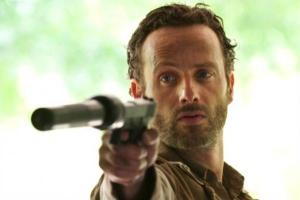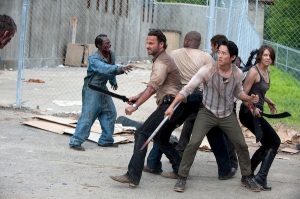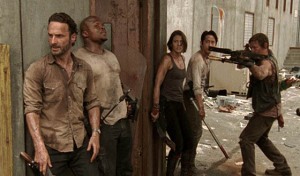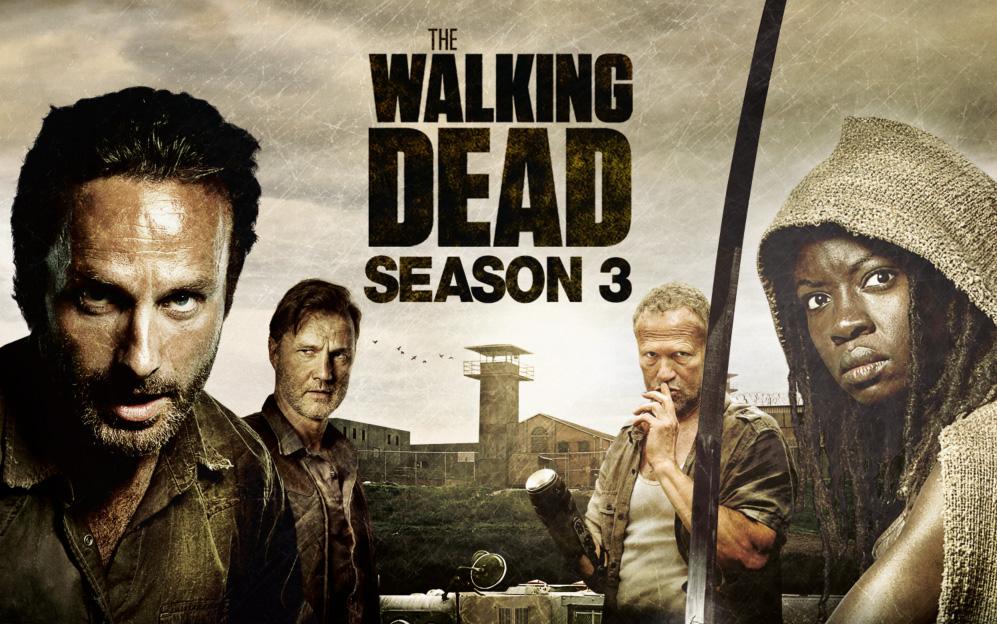
At this point, The Walking Dead is going to need one hell of a season if it's ever going to shake off its reputation for being television's most consistently frustrating show that everyone's watching. Within the same episode, it can go from deliciously pulpy and squirm-inducing, to so maddeningly tedious, that you start rooting for the reanimated corpses. Worse yet has been the pattern that's emerged over the first two seasons, which aired in three discreet chunks: terrific premieres and strong finales bookend connecting stories that feature plenty of wheel-spinning, irrational or irritating characters, and roughly two minutes of actual zombie action an episode. It's incredible that the season three premiere, "Seed", gets so much right, that it could be called a nearly unqualified triumph were it not for the show's history telling us to keep our excitement in check. I'm hoping that I'm proven completely and utterly wrong of course, and that a show worthy of the exceptional first two episodes (which seem a distant memory at this point) finally comes to life. The most important evidence suggesting such hope isn't foolish this time around is that showrunner Glen Mazzara finally has control of the season from start to finish, having taken over for Frank Darabont after his unceremonious canning midway through last year. The season two finale -a cathartic (and literal) barn-burner that saw the survivor population welcomely culled, and put back on the run- cleared out a lot of the character and dramatic baggage that had clogged up the narrative during the never-ending stint on the farm, and reset everyone's immediate motivation back to its most basic: survival.
The opening scene makes that abundantly clear, as Rick leads his equivalent of a wetworks team through an abandoned house looking for supplies, stealthily blowing the brains out of any corpses that've taken up residence there. It's surprising to see that Carl is a part of this crack unit, as the silenced pistol he carries is bigger than his forearm, but it's even more shocking that he's actually become a pretty capable zombie-exterminator. Clearing out the house turns up only a couple cans of pomeranian chow, and before the clearly exhausted group has time to sulk, a new gaggle of the undead are already bearing down on the location, and everyone gets back on the move.

As tempting as it is to say that the success of the opening was due to everyone keeping their mouth shut, it worked because it did something that The Walking Dead has always struggled with: showing us what's happening instead of telling us. Carl's new bangs and Lori's ballooning stomach act as clear, yet subtle enough indicators of the months gone by, and while it might seem arrogant (even a little stupid) for Rick to deny his son a perfectly good can of dog chow, we know that there's still a (perhaps illusory) scrap of dignity he's looking to hold on to.
Best of all though, the SWAT-style raid of the house showed us a level of competence heretofore unseen amongst Rick's posse. Little things, like Maggie grabbing a stray wood axe, or putting Carl on watch while the group plans their next move in the middle of the road, not only underline just how dire the situation has become, but also make us think more highly of the characters. Even if they can still be erratic and underwritten on an individual level, it's easier to root for a group of people who do everything right in a dangerous situation -and barely scrape by all the same-, than a bunch of sweaty whiners who seem more interested in each other's bullshit than the hordes of zombies all around them.

So when Rick and Darryl stumble upon a Godsend, the narrative-based knot in my stomach starting acting up again. Even if you haven't read Kirkman's original comic book series on which the show is based, the abandoned prison was so heavily teased at the end of last season that its discovery was all but a certainty, it was just a matter of when. The warning bells went off because the episode was getting into a nice groove, and while the prison story was fine in the comic series, so was the farm arc, and look how that translation turned out. The prison promises food, weapons, high walls and warm beds. Of the many ways The Walking Dead has accidentally snared the story in the past, letting its characters get comfortable has been among the most reliable.
For the present though, "Seed" smartly lays out an objective for the characters to accomplish within the episode, and then shows them doing it. There were no sidebars about Shane calling out Rick, no time wasted time spent looking for stray survivors, and no existential musing; this hour was all about storming the castle, and again, it was the little details that turned good action into great television. The deliberate approach taken to get passed the prison's outer perimeter offered more examples of how adjusted everyone is to the business of killing zombies, with former deadweights like Carol, and Herschel's other daughter (who's name, I'd say escaped me, if I was sure she had ever been named) contributing, both as useful distractions, and as undead-executioners.

And, okay, for as good as the show can be about certain technical aspects of the zombie apocalypse, it can also be downright silly with regard to others. Watching anybody, let alone Carl, headshot zombies from 50 yards away with a pistol is pretty ridiculous, as is the notion that precious ammo would be spent willy nilly one minute, and then coveted once someone comments on the sudden scarcity of rounds in the next scene. It's hard to fault the writers for falling back on tropes that we accept without a second thought in big budget action movies, but the raw nature of The Walking Dead makes it feel lazy when ninja-badass Michonne can perform a double decapitation with only half a foot of wind-up on her katana.
But when it does get the technicals right, few movies, let alone TV programs, understand the physical demands of zombie slaying quite like The Walking Dead. Everyone is constantly sweating under the Kentucky heat, and once you factor in the energy it takes to drive a knife into the human skull, Rick's plan to clear out a cell block using hand-to-hand weapons looks as risky as it sounds. It creates a fantastic sequence where the infiltration team forms a mobile circle of death, cutting a swath through the horde with lethal efficiency. Then, that composure breaks down at the sight of a new threat, former prison workers completely covered in riot gear, and the survivors are forced to adapt to a new breed of danger.

It was the best sustained tension the show has strung together since season two's premiere, which featured a nail biting game of highway hide and seek. For as often as some episodes make you forget that there are supposed to be zombies in this world, "Seed" delivered plenty of interesting ghoul variants, the best being the riot guard who's face sloughs off like skin on an undercooked piece of fried chicken. It's hard not to feel spoiled by a fourth and final action sequence, a claustrophobic and dark journey through the inner bowels of the prison, one that ended the inventive steak with a bout of "sudden on-set zombie horde syndrome." True, the only thing scarier than a zombie apocalypse is a zombie apocalypse that rarely plays by the rules, but it gets harder to believe that Rick and company can get so easily outflanked by shambling corpses the more often it happens.
Regardless, it leads to the most impactful moment of violence in an exceptionally violent episode, where Rick has to amputate Herschel's leg after a walker makes chewing gum out of his achilles tendon. It's uncompromisingly brutal, and like throwing out the can of dog food during the opening, it proves there are still new lows to be found in this new world order, hacking off a man's leg being one of them. Killing the undead may be second nature by now, but violence against the living still elicits emotion out of everyone, and the newly discovered prisoner sums up Rick's improv surgery with an appropriate "holy shit."

This was an episode almost entirely devoted to action, which has never been a real issue for The Walking Dead, it was the people undertaking, or delaying, or bickering about said action that caused problems. Perhaps it was because there wasn't enough time for more than a surface glance at how everyone has changed over the last few months, but the character developments so far seem to be for the better. Contrary to what you might expect, Lori's pregnancy has made her more rational and less shrill than ever, and the writers are finally taking steps to establish a sympathetic point of view, one deeply buried under all the screaming and scheming she did last season. Hell, how can't you feel at least a smidgen of shared fear for a person who's baby might turn out to be a zombified chest-burster?
The sheer terror of day-to-day survival seems like the wakeup call everyone needed to rein in their personal crap. Carol is actually cracking jokes about her relationship with Darryl, as they've come to trust Rick again, and Carl isn't running off every five minutes. Out of all of them though, Rick seems to be the one closest to collapse. Having to make call after call that could mean survival or gruesome death has clearly taken its toll on him, so he more than anyone else wants the prison to be the safe haven it could one day become. The safety exchanged for freedom that the Rick-tatorship offers is pretty well represented by the prison itself, as everyone's more excited about the new digs than you'd expect for people living in jail cells. At this point though, a clean bed and three sets of four walls surrounding them seems almost too good to be true.

And once things start going bad, as they inevitably will, Rick's leadership is going to face its biggest test, and so will the show. Is this the start of a new era of decisive, smart storytelling, or will episode after episode of stunted narrative drive and constant squabbling return once more? Even though history says I shouldn't be, I find myself more excited than ever for what The Walking Dead does next.
- Stray Thoughts
-AMC's pimping out of the show is almost unbearable at this point, though it won't end anytime soon, seeing as it's a ratings monster. Having a talk show is one thing, having multiple ads for the show during commercial breaks is another, but having the characters drive a pristine new Hyundai in the middle of the damned apocalypse makes me want to throw out my TV set.
-There are times when writers try too hard to make a breakout character even cooler, and it just blows up in their face. Giving Darryl a poncho was not one of those times.
-Andrea seems to have caught a nasty virus of some kind during her time with Michonne. We don't spend much time with them this week, but I'm interested to see more of their dynamic, having presumably spent the last few months together.
-Fans of the comics will know that amputating a bitten extremity has mixed results, so i'm thankfully unsure of Herschel's survival chances. He is the only doctor (well, veterinarian) in the group though, and having one on hand is pretty much a must in these kinds of stories.
-Everybody sharing a song before bed comes second only to Daryl's watch speech in Season One, as being the kind of filler scene that exists because that's the sort of scene you write when there's downtime around a campfire.
-Zombie kill of the week: so many to choose from, but Rick nonchalantly decapitating a walker as the group moves into the prison was satisfyingly casual.

